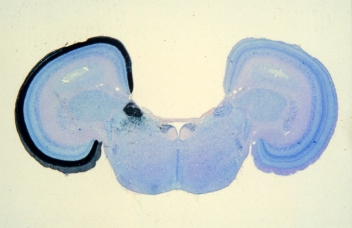
|
Research topics
The primary research program of our lab is to understand the neural basis of cognitive abilities in non-mammals; particularly how their brains, despite the lack of a "neocortex," perceive and discriminate complex visual tasks. Birds are used as subjects in my laboratory because of their superb visual abilities. Our research project consists of interdisciplinary approaches: anatomical, chemical/molecular, behavioral methods.
 Anatomically, we conduct studies investigating the organization of the visual pathways in birds. The results thus far show that the main visual pathway in the avian forebrain consists of distinct channels in terms of connections, morphology, and ultrastructure. Thus, the results suggest that the avian visual pathway processes visual information in a parallel fashion, as does the primate visual pathway.
Anatomically, we conduct studies investigating the organization of the visual pathways in birds. The results thus far show that the main visual pathway in the avian forebrain consists of distinct channels in terms of connections, morphology, and ultrastructure. Thus, the results suggest that the avian visual pathway processes visual information in a parallel fashion, as does the primate visual pathway.
Chemically and molecularly, a current focus in our lab is to study the expression of immediate early gene proteins which are believed to be a crucial step in the cellular process underlying long-term memory formation. We are interested in studying the relationship between the expression of an IEG protein and various behaviors associated with visual memory, such as visual recognition of conspecific species and homing behavior of pigeons.
 Behaviorally, we are interested in the ability of birds to discriminate stimuli that exist in their natural environment (e.g., images of conspecific species). By manipulating videotaped and computer-animated views of female pigeons (potential mates) as stimuli and measuring male subjects' courtship responses to the stimuli, we investigate which sensory features are important for the recognition of conspecific species.
Behaviorally, we are interested in the ability of birds to discriminate stimuli that exist in their natural environment (e.g., images of conspecific species). By manipulating videotaped and computer-animated views of female pigeons (potential mates) as stimuli and measuring male subjects' courtship responses to the stimuli, we investigate which sensory features are important for the recognition of conspecific species.
In addition, a new project under development is to clarify the relationship between traumatic brain injury (TBI) and Alzheimer's Disease (AD) and to develop stem-cell based therapies for TBI and AD. In collaboration with colleagues in Biology and Neurosurgery, the hypothesis is that TBI precipitates AD and thus treatments available for AD may be beneficial for TBI cases as well. The proposal has been funded for a preliminary study.
|
|

|







